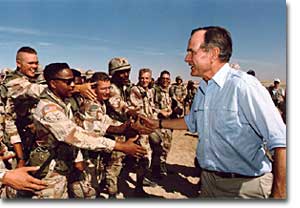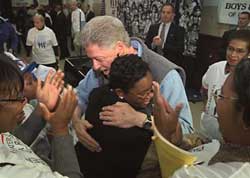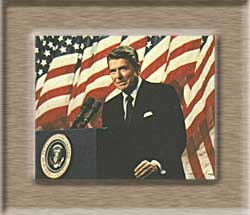7d. The President's Job

President George Bush, seen visiting troops during a Thanksgiving trip to the Persian Gulf, was successful in combating a crisis in the Middle East, resulting in a leap in his approval ratings.
Just what exactly does the President do all day?
The evolving power and enlarging scope of responsibilities have made the modern presidency a very big job. Some even say that it is impossible for one person to handle it all.
Presidents as Crisis Managers
The Constitutional power as "Commander in Chief" has evolved into the very important modern role of "crisis manager." In the 20th century, as the United States gained world leadership powers, the President has become a key player in international crises. In the case of war — such as the Korean War, the Vietnam War, and the Persian Gulf War — or less famous regional conflicts — such as those in Kosovo, Somalia, or Haiti — the President must go into "emergency mode" and concentrate on the immediate problem. Domestically, crises may occur — such as urban riots, hurricanes, or forest fires — that require the President to schedule time to coordinate government responses to the situation.
Presidents as Symbols and Administrators
More than anyone else, the President symbolizes the country — its people and its beliefs. In this role, a President performs many ceremonial duties, such as receiving foreign dignitaries, throwing the first baseball of the season, and walking on red carpets while waving to crowds. These actions are not trivial. Strong Presidents must exude confidence, not just in themselves, but in the American people as well. The best ones have had an intangible charisma that engendered public confidence.

Presidential public appearances aren't always made from behind a podium. Here, President Clinton tours a Boys and Girls Club in Washington, D.C., on Martin Luther King Day.
As leader of the executive branch, the President is primarily responsible for seeing that the work of government is done. A famous sign sat on President Harry Truman's desk, "The buck stops here." The responsibility to administer and execute the laws of the land squarely rests on the President's shoulders.
The president must therefore recruit and appoint many people to top government jobs. Cabinet members, many sub-Cabinet positions, federal judges including Supreme Court Justices, ambassadors, top military leaders, and heads of independent government agencies are all appointments filled by the President. Even though nominees are subject to consent by the Senate, the fact that Presidents control more than 4,000 appointments to government service makes this responsibility an important one.
Presidents as Agenda Setters

Presidents have considerable power in setting the agenda of lawmakers, especially in the field of foreign affairs. Ronald Reagan's strong stance against communism defined U.S. foreign policy in the final years of the Cold War.
Setting a political agenda has been a role that has grown in recent years. The founders clearly intended that Congress take the lead in setting priorities and determining policies. Today, Presidents have plans for Social Security, welfare programs, taxes, inflation, and public education. In foreign policy, they often act first, and then consult Congress. Virtually all recent Presidents regularly recommend legislation to Congress.
Strong Presidents have used the State of the Union address, given yearly at the start of each congressional session, to set an agenda. Modern Presidents now use the media to bring attention to their proposals and to place pressure on legislators. A President may threaten a veto before the bill gets to the Oval Office. This action lets legislators know the President's agenda and pressures them to rethink bills that they know will be vetoed.
Can any one person hope to be able to successfully hold the President's job? The great author John Steinbeck commented, " We give the President more work than a man can do, more responsibility than a man should take, more pressure than a man can bear." Yet, recent Presidents somehow have managed to endure — although the job has exacted a tremendous toll on each of them.







